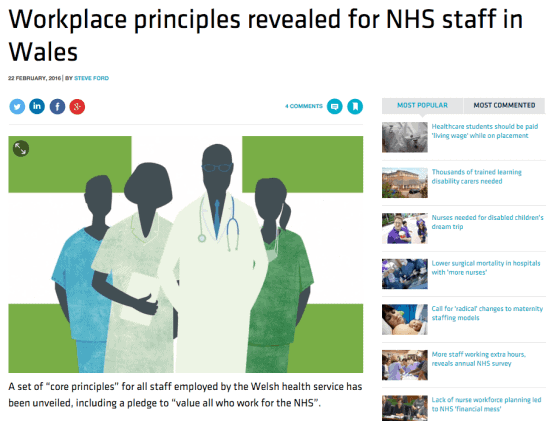U.S. Residents: Don't forget you have a chance to win a free copy of Healthcare Kaizen if you click here by March 5 (learn more).
And now on to today's post…
Each Saturday, I get an email newsletter from the UK-based site “Nursing Times.” They cover issues that are somewhat universal in healthcare, including patient safety, healthcare culture, nursing shortages, budget cuts, and the like.
Last week, this article, caught my eye:
“Workplace principles revealed for NHS staff in Wales.” A free registration might be required to read it or other articles, but it's worth it.

You can also read a release from the government of Wales.
The Welsh NHS is establishing and promoting “six core principles” that are “are intended to be the foundation of how staff should work across and within NHS Wales, said health and social services minister Professor Mark Drakeford.”
He added: “These principles will be owned by everyone connected to the NHS in Wales, especially the staff, who already embody them; whether it is putting their patients first, learning from their experiences or pulling together as teams.”
I hope this is true… if the principles are NOT “owned by everyone,” then an initiative like this might end up demoralizing the people it's meant to help. I think “values” statements like this are noble and helpful, but leaders at all levels need to “walk the walk.” As I've written about before, if an organization is going to SAY they “make patient safety a top priority,” it can't just be lip service.
But back to the NHS in Wales… the six key principles are reminiscent of Lean thinking. Neither Lean nor the Toyota Production System are mentioned in the article, so it's impossible to know if Lean was an influence, or if this happens to be good thinking that happens to line up with Lean.
Listen to Mark read this post (subscribe to the podcast):
The principles are below in the blockquote boxes, with my commentary below.
1) We put patients and users of our services first: We work with the public and patients/service users through co-production, doing only what is needed, no more, no less and trying to avoid harm. We are honest, open, empathetic and compassionate. We ensure quality and safety above all else by providing the best care at all times
Putting the patient (aka the customer) first is the first part of the Toyota philosophy, as I wrote about last week.
Doing “only what is needed, no more, no less and trying to avoid harm” sounds like Lean thinking (although Lean Yoda might say there is no “try,” only “do or not do”). What is the Welsh NHS doing to improve systems and create a “culture of safety.” Are they really letting people put quality and safety first? That first principle there is really a few principles, isn't it?
2) We seek to improve our care: We care for those with the greatest health need first, making the most effective use of all skills and resources and constantly seeking to fit the care and services we provide to users' needs. We integrate improvement into everyday working, by being open to change in all that we do, which also reduces harm and waste
Improving every day… that sounds like “Kaizen” and Lean, especially when focused on goals that matter, such as reducing harm to patients. You just have to hope that “being open to change” doesn't mean leaders forcing staff to go along with changes that are forced on them. As we see at organizations like Franciscan St. Francis (you can come and see in April), Kaizen and change is a participatory activity and it's voluntary.
3) We focus on wellbeing and prevention: We strive to improve health and remove inequities by working together with the people of Wales so as to ensure their wellbeing now and in future years and generations
“Value” as we would say in the Lean approach doesn't just include fixing the body when it breaks down… it means keeping people healthy and maintaining quality of life. Even back in factories, the Lean approach to machine maintenance (“TPM“) focuses on keeping machines healthy and preventing downtime or problems.
4) We reflect on our experiences and learn: We invest in our learning and development. We make decisions that benefit patients and users of our services by appropriate use of the tools, systems and environments which enable us to work competently, safely and effectively. We actively innovate, adapt and reduce inappropriate variation whilst being mindful of the appropriate evidence base to guide us
Learning and reflection is a key part of the Kaizen process and Lean philosophy… the Plan, Do, Study, Adjust cycle (PDSA) means that we evaluate our changes and reflect on what we've done. This is what leads to innovation, improvement, and the reduction of “inappropriate variation” (I'd point out that not all variation is bad or harmful).
5) We work in partnership and as a team: We work with individuals including patients, colleagues, and other organisations; taking pride in all that we do, valuing and respecting each other, being honest and open and listening to the contribution of others. We aim to resolve disagreements effectively and promptly and we have a zero tolerance of bullying or victimization of any patient, service user or member of staff
I guess taking “pride” in what you do is important (although Lean thinking emphasizes “humility“). But, then again, Dr. Deming talked about need for joy in work and part of that comes from feeling proud about doing high quality work. Valuing and respecting other people (“respect for people“) is certainly a core TPS / Lean mindset. And, of course, bullying has no place in a Lean culture or workplace.
6) We value all who work for the NHS: We support all our colleagues in doing the jobs they have agreed to do. We will regularly ask about what they need to do their work better and seek to provide the facilities they need to excel in the care they give. We will listen to our colleagues and act on their feedback and concerns
There's the notion of “respect for people” again, which includes leaders asking employees what they need to “do their work better.” Listening to feedback and concerns is a critical aspect of a “culture of safety” and a “culture of continuous improvement.”
What's your reaction to these principles? Does your organization have similarly stated goals and values? Do leaders live up to the promise made in such statements or do people just get cynical about it?
Please scroll down (or click) to post a comment. Connect with me on LinkedIn.
Let’s build a culture of continuous improvement and psychological safety—together. If you're a leader aiming for lasting change (not just more projects), I help organizations:
- Engage people at all levels in sustainable improvement
- Shift from fear of mistakes to learning from them
- Apply Lean thinking in practical, people-centered ways
Interested in coaching or a keynote talk? Let’s talk.









Great eye-opener and words to live by! Thanks for sharing Mark.
Indeed… words to live by and, hopefully, not just words to talk about or post on the wall at work :-)
this is more evidence that NHS Wales is moving in the right direction under the best minister for health anywhere in the world
It is just a bit unfortunate that the 1st time I have heard about it is on an American authors blog……
Interesting… so they were “announced” in Wales… just not very widely?
They certainly look good, and they do sound as if Lean could have been an influence. I’m especially glad to see the emphasis on continuous improvement. But when I read these value statements or mission statements (whether they’re put out by a hospital or a law firm – my area of expertise) I often try to think of them from the patient’s (or in my case, the client’s) perspective. Then, a lot of them start to look like a set of “must-haves.” I expect my healthcare providers to put me first, to work in teams, to use all their skills and resources effectively. If the NHS in Wales isn’t delivering on these values, then they and their leaders better really start “walking the walk.”